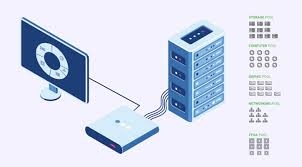Composable : Empowering IT Teams
Composable infrastructure represents a significant evolution in IT hardware management, offering a flexible and efficient approach to resource allocation. At its core, composable infrastructure abstracts compute, storage, and networking resources from their physical locations, creating a pool of resources that can be dynamically allocated based on workload requirements. This abstraction is managed through software, often via APIs, which allows for rapid provisioning and reconfiguration of resources. This approach contrasts sharply with traditional IT infrastructure, where resources are typically fixed and manually configured, leading to inefficiencies such as over-provisioning or underutilization.
One of the primary benefits of composable infrastructure is its ability to enhance agility and scalability within data centers. By treating physical resources as services that can be composed and recomposed as needed, organizations can respond more quickly to changing business demands. This is particularly valuable in environments that require high operational velocity, such as those supporting DevOps practices or running containerized applications. The ability to provision infrastructure on-the-fly, similar to how cloud services are managed, allows for a more responsive and adaptable IT environment.
Moreover, composable infrastructure promotes optimal resource utilization. Traditional infrastructure often leads to silos of resources dedicated to specific applications or workloads, which can result in significant inefficiencies. In contrast, composable infrastructure allows for a more fluid allocation of resources, reducing both underutilization and overprovisioning. This not only improves performance but also lowers costs by ensuring that resources are used more effectively. The unified management interface provided by composable infrastructure further simplifies operations, integrating formerly siloed infrastructure and enabling IT to be offered as a service.
The implementation of composable infrastructure also supports the integration of legacy applications with modern IT practices. Many organizations have critical legacy systems that cannot be easily migrated to the cloud or re-architected for modern infrastructure. Composable infrastructure provides a way to modernize these environments without disrupting existing operations. By abstracting the underlying hardware, it allows legacy applications to coexist with new, cloud-native applications within the same infrastructure, facilitating a smoother transition to modern IT practices.
Benefits
Composable infrastructure offers several key benefits that make it an attractive option for modern IT environments:
Flexibility and Agility: Organizations can quickly adapt to changing business needs by dynamically allocating resources. This flexibility allows for faster deployment of applications and services.
Cost Efficiency: By optimizing resource utilization, composable infrastructure can reduce the need for overprovisioning and lower overall infrastructure costs. Resources are used more efficiently, leading to cost savings.
Scalability: As business needs grow, composable infrastructure can easily scale to accommodate increased demand. This scalability ensures that organizations can handle peak loads without compromising performance.
Simplified Management: With a unified management interface, IT teams can manage the entire infrastructure from a single pane of glass. This simplifies operations and reduces the complexity of managing disparate systems.
Improved Performance: By allocating resources based on specific workload requirements, composable infrastructure can optimize performance for different applications. This ensures that critical applications receive the resources they need to operate efficiently.
In addition to these operational benefits, composable infrastructure also enhances the overall resilience and reliability of IT environments. The decoupling of resources from their physical hardware means that failures in one component do not necessarily impact the entire system. Resources can be dynamically reallocated to maintain service continuity, improving the overall robustness of the infrastructure. This is particularly important in mission-critical environments where downtime can have significant consequences.
In summary, composable infrastructure offers a transformative approach to IT resource management, providing greater agility, scalability, and efficiency. By abstracting and pooling resources, it enables dynamic allocation based on real-time needs, reduces inefficiencies, and supports the integration of legacy and modern applications. As organizations continue to seek ways to optimize their IT operations and respond to evolving business demands, composable infrastructure stands out as a powerful solution that aligns with the principles of modern, software-defined data centers.
Composable : Empowering IT Teams
Composable infrastructure represents a significant evolution in IT hardware management, offering a flexible and efficient approach to resource allocation. At its core, composable infrastructure abstracts compute, storage, and networking resources from their physical locations, creating a pool of resources that can be dynamically allocated based on workload requirements. This abstraction is managed through software, often via APIs, which allows for rapid provisioning and reconfiguration of resources. This approach contrasts sharply with traditional IT infrastructure, where resources are typically fixed and manually configured, leading to inefficiencies such as over-provisioning or underutilization.
One of the primary benefits of composable infrastructure is its ability to enhance agility and scalability within data centers. By treating physical resources as services that can be composed and recomposed as needed, organizations can respond more quickly to changing business demands. This is particularly valuable in environments that require high operational velocity, such as those supporting DevOps practices or running containerized applications. The ability to provision infrastructure on-the-fly, similar to how cloud services are managed, allows for a more responsive and adaptable IT environment.
Moreover, composable infrastructure promotes optimal resource utilization. Traditional infrastructure often leads to silos of resources dedicated to specific applications or workloads, which can result in significant inefficiencies. In contrast, composable infrastructure allows for a more fluid allocation of resources, reducing both underutilization and overprovisioning. This not only improves performance but also lowers costs by ensuring that resources are used more effectively. The unified management interface provided by composable infrastructure further simplifies operations, integrating formerly siloed infrastructure and enabling IT to be offered as a service.
The implementation of composable infrastructure also supports the integration of legacy applications with modern IT practices. Many organizations have critical legacy systems that cannot be easily migrated to the cloud or re-architected for modern infrastructure. Composable infrastructure provides a way to modernize these environments without disrupting existing operations. By abstracting the underlying hardware, it allows legacy applications to coexist with new, cloud-native applications within the same infrastructure, facilitating a smoother transition to modern IT practices.
Benefits
Composable infrastructure offers several key benefits that make it an attractive option for modern IT environments:
Flexibility and Agility: Organizations can quickly adapt to changing business needs by dynamically allocating resources. This flexibility allows for faster deployment of applications and services.
Cost Efficiency: By optimizing resource utilization, composable infrastructure can reduce the need for overprovisioning and lower overall infrastructure costs. Resources are used more efficiently, leading to cost savings.
Scalability: As business needs grow, composable infrastructure can easily scale to accommodate increased demand. This scalability ensures that organizations can handle peak loads without compromising performance.
Simplified Management: With a unified management interface, IT teams can manage the entire infrastructure from a single pane of glass. This simplifies operations and reduces the complexity of managing disparate systems.
Improved Performance: By allocating resources based on specific workload requirements, composable infrastructure can optimize performance for different applications. This ensures that critical applications receive the resources they need to operate efficiently.
In addition to these operational benefits, composable infrastructure also enhances the overall resilience and reliability of IT environments. The decoupling of resources from their physical hardware means that failures in one component do not necessarily impact the entire system. Resources can be dynamically reallocated to maintain service continuity, improving the overall robustness of the infrastructure. This is particularly important in mission-critical environments where downtime can have significant consequences.
In summary, composable infrastructure offers a transformative approach to IT resource management, providing greater agility, scalability, and efficiency. By abstracting and pooling resources, it enables dynamic allocation based on real-time needs, reduces inefficiencies, and supports the integration of legacy and modern applications. As organizations continue to seek ways to optimize their IT operations and respond to evolving business demands, composable infrastructure stands out as a powerful solution that aligns with the principles of modern, software-defined data centers.






